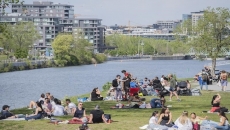British Columbia is Canada's first province to introduce a business and environmental strategy on how renewable and low-carbon hydrogen can reduce emissions and create jobs in the clean technology sector.
Bruce Ralston, minister of energy, mines and low carbon innovation, says the strategy uses actions involving government, industry and innovators to help achieve net-zero carbon emissions by 2050.
With the release of BC's #Hydrogen Strategy, we're paving the way for our shared #lowcarbon future. To learn more, read the strategy here: https://t.co/ocLKIj4lXv #CleanBC @GeorgeHeyman
— Bruce Ralston (@BruceRalston) July 6, 2021
He says the short-term goals include establishing regional hydrogen hubs to supply fuel to industries and consumers, while increasing the numbers of medium and heavy-duty vehicles powered by hydrogen on highways and at industrial sites.
Ralston says hydrogen produces no carbon emissions when burned or used in a fuel cell and is considered a climate-friendly solution to industrial activities where the use of electricity is not practical.
Hydrogen can be produced from many sources, including both fossil fuels and renewable resources, although the B.C. plan would support the so-called green pathway, using hydro electricity to create the fuel.
Ralston acknowledges B.C.'s previous attempt to embrace the technology more than a decade ago that included development of a hydrogen highway from B.C. to California, were ahead of their time and are now better positioned to succeed.
Ralston says B.C. is a global leader in the area, with more than 50 per cent of Canada's hydrogen and fuel-cell companies located in the province and where about 60 per cent of research investment is conducted.
The ministry estimates hydrogen has the potential to reduce B.C.'s emissions by 7.2 million tonnes of carbon dioxide each year by 2050.
"The B.C. hydrogen strategy outlines 63 actions for government, industry and innovators to take aim at accelerating the production, use and export of renewable and low carbon hydrogen," Ralston told a news conference, adding transitioning heavy-duty vehicles to hydrogen power as "the next frontier."






